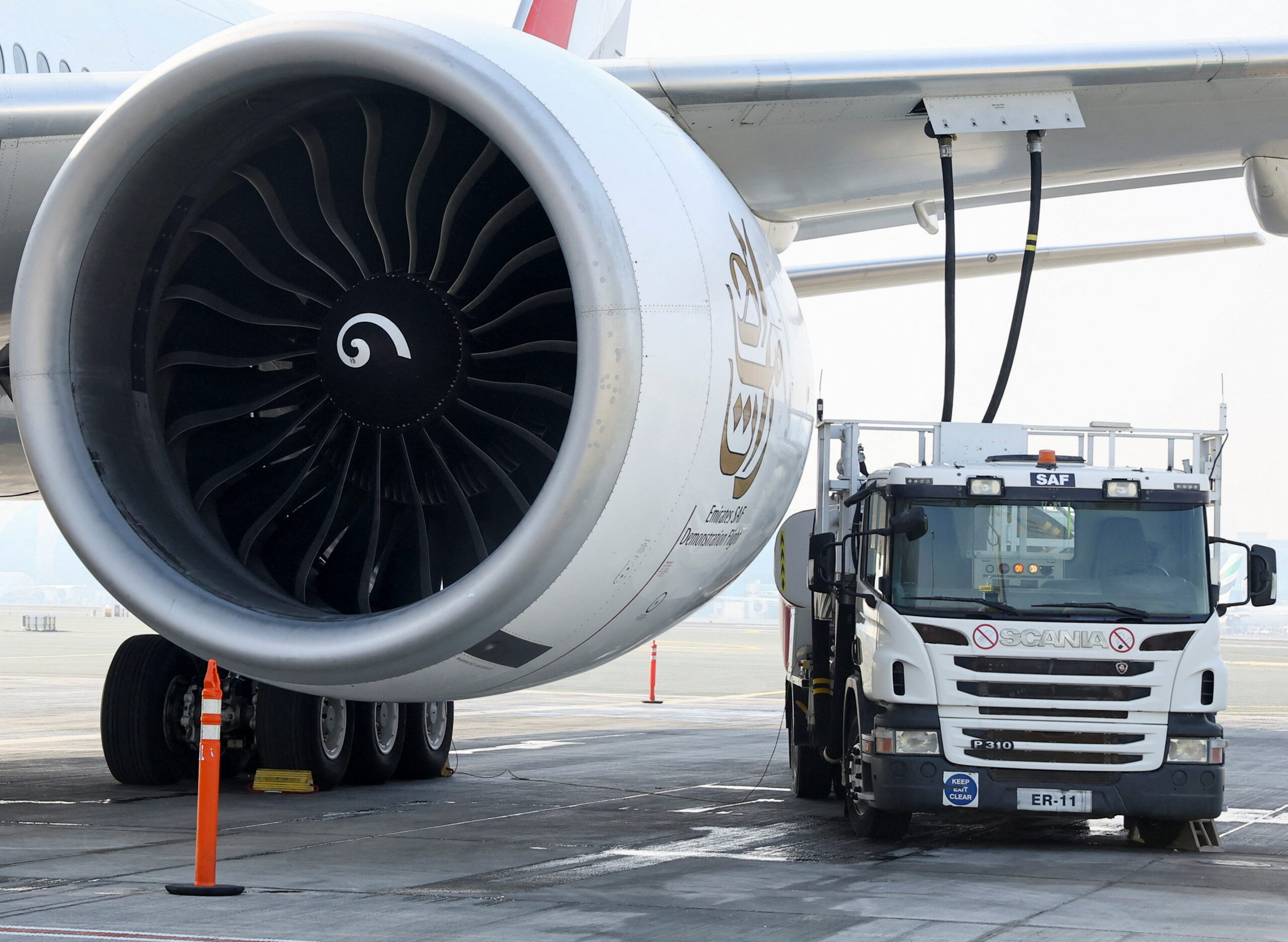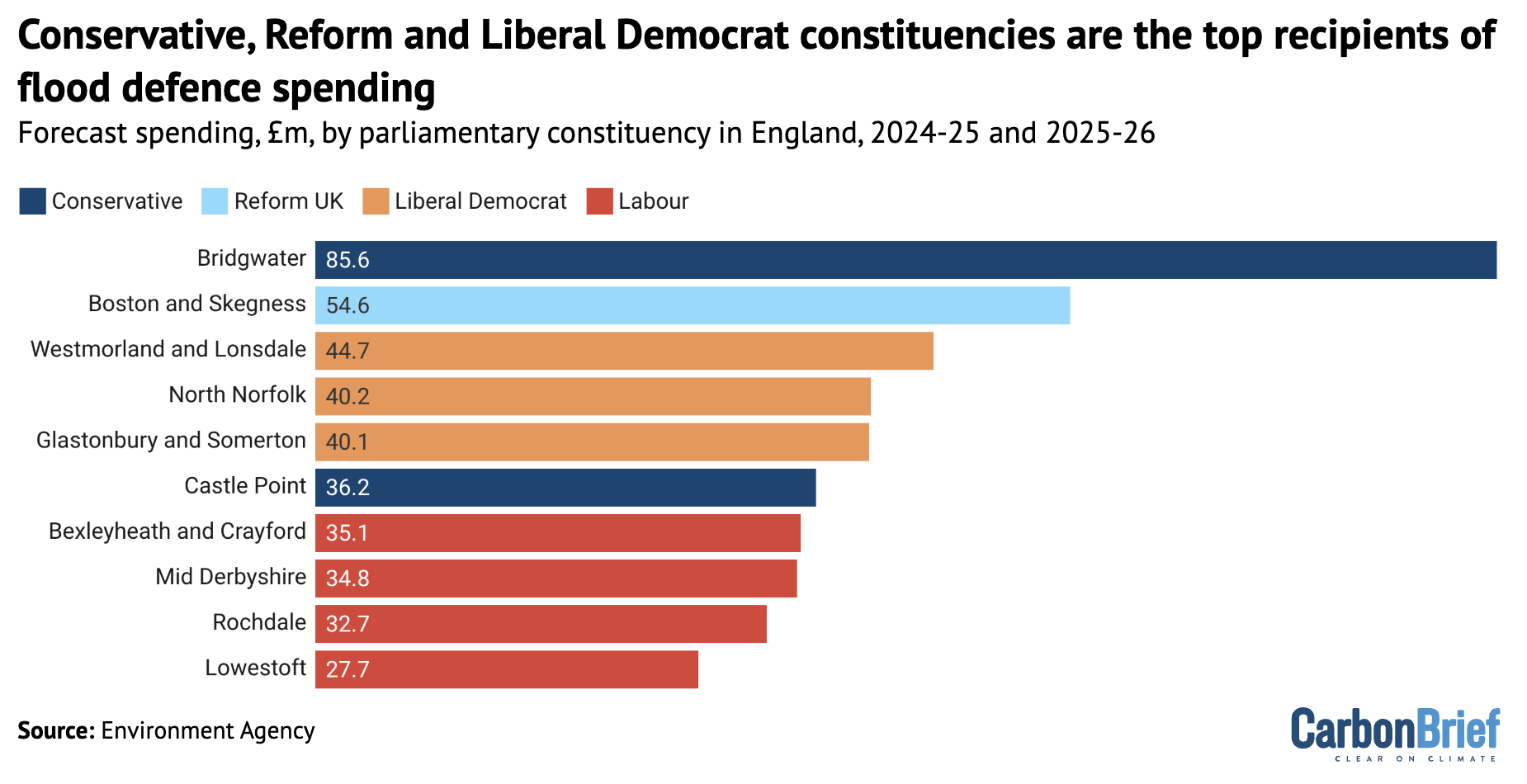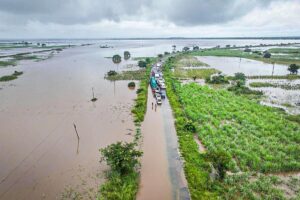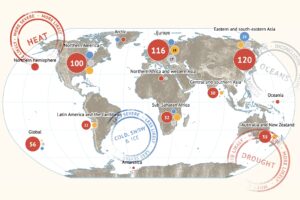This article will be updated throughout the day and an edited version will be sent out each evening as a newsletter – you can sign up here.
Is the end near for COPs in petrostates?
Fossil fuels have been given warm hospitality at COPs in recent years, with the last two climate summits being held in fossil fuel-expanding petrostates with presidencies even getting caught promoting oil and gas deals on the job.
That’s why a group of top climate experts, scientists and former UN chiefs called for reform in an open letter published this Friday, where they argue that countries expanding oil and gas should not be able to hold the COP presidencies.
Signed by former UN climate chief Christiana Figueres and former UN Secretary-General Ban Ki Moon, the letter calls on countries to establish a “strict eligibility criteria to exclude countries who do not support the phase out/transition away from fossil energy”.
The letter does not provide details of who would judge this criteria. Climate Home requested additional information, but had not received a response at the time of publication.
While the experts recognise the importance of UN climate talks, they also call for reform of the COP process, writing that the “current structure simply cannot deliver the change at exponential speed and scale” needed to address the climate crisis.
The COP29 presidency has been vocal about its disinterest in a quick fossil-fuel phase out, with Azerbaijan’s President Ilham Aliyev even telling the opening plenary that fossil fuels are a “gift from god” and that “we must be realistic” about energy transition.
An analysis of Aliyev’s speeches published today by campaign group 350.org found that the Azeri president defended or promoted fossil fuels in more than three quarters of his energy and climate-related speeches. In over a year of such speeches, Aliyev never even mentioned the Paris Agreement, the campaign group found.
Some campaigners backed the reform proposal. Catherine Abreu, director of the International Climate Politics Hub, said it is “demoralising” to hear the messages sent by Azerbaijan’s COP presidency.
She told media in Baku that the UN climate body, UNFCCC, should come up with a “conflict of interest policy” for delegates and the COP presidency that “puts a firewall between fossil fuel interests and the COP process.
She also called on countries to limit the influence of fossil fuel lobbyists at COP. According to another report published today by Global Witness, almost 1,800 lobbyists have shown up at COP29 – around 700 hundred less than last year but more than the 10 most climate-vulnerable countries combined.
Currently, countries can select who participates in their delegations, either with a “party” or “party overflow” badge. They do not choose people with an “observer” badge. Most lobbyists are observers, but some countries such as Japan, the UK, Canada and Italy brought fossil fuel lobbyists as part of their national delegations, the Global Witness report found.
According to the report, the biggest group of fossil fuel lobbyists is from an observer group called the International Emissions Trading Association (IETA) which sent 43 people.
But IETA denies this characterisation. While it does have a representative from French oil and gas giant TotalEnergies, an IETA spokesperson told Climate Home their delegates were “a broad mix” which “includes emitters who are committed to a just transition and solution providers who will help them on that journey”. Drawing up an exclusion list will be contentious.
Peace, Baku style
It is the “Energy, Peace Relief and Recovery” Day here in Baku. But if you’re running through the halls you won’t note much change – as there hasn’t been in conflict-afflicted nations across the world, despite Azerbaijan’s COP Truce proposal.
The COP29 host wanted to pause all the conflicts in the world – which number more than 50 – for the duration of the climate talks, inspired, they said, by the Olympic Truce.
On Friday, the COP Truce appeal did not feature prominently on the agenda. Nonetheless, the presidency said that the initiative received the support of 132 countries. That includes nations currently involved in civil wars and international conflicts, like Sudan, Myanmar, and the Democratic Republic of the Congo.
Azerbaijan itself has yet to reach a fully-fledged peace deal with neighbouring Armenia. According to Azeri media, Azerbaijan’s Foreign Ministry said that there cannot be any “physical meetings” with their Armenian counterparts until December as the climate summit is the government’s main focus.
When the COP Truce was first announced, climate campaigners called it a “performative… PR exercise” and “a distraction” from a separate UN-supported push to strengthen climate action in conflict-affected regions.
On that front, the COP29 presidency and six countries launched today the ‘Baku Call on Climate Action for Peace, Relief, and Recovery’, aiming to develop a strategy for preventing climate-induced wars and scaling up support for conflict-struck vulnerable nations.
The initiative will see the creation of a hub through which countries can “collaborate on peace and climate initiatives”.
During an event on this initiative, Climate Home asked Elshad Iskandarov, special envoy of Azerbaijan’s Ministry of Foreign Affairs, about the ceasefire appeal. He said that the truce was proposed to “foster peace in the world and highlight the importance of climate” without giving any further details.
But not everyone feels attuned to the “COP of peace” vision pushed by the COP presidency. Mohammed Usrof, founder of the Palestinian Youth Climate Negotiators Team, voiced concerns about COP29 being hosted in Azerbaijan because the country is Israel’s biggest crude oil supplier, as shown in a recent report by Oil Change International.
Mila Sirychenko, a Ukrainian activist, had reservations about expressing her views at COP due to the large size of the Russian delegation. Russia’s party at this COP counts 900 people, only topped by the Azeri (995) and Brazil delegations (984).
Chevron, ExxonMobil, BP, Shell and Eni – all companies that supply crude oil to Israel – brought a combined total of 39 lobbyists to the climate summit.
“So many others continue to be complicit with maintaining business as usual,” Usrof told Climate Home, referring to the almost 1,800 fossil fuel lobbyists at COP, many of whom are part of countries’ official delegations. “And, as we see, the business as usual involves the genocide of Gazans”.
“Puzzling” lack of pledges for adaptation
There’s a “great paradox” in evidence at COP29 between leaders’ speeches urgently calling to keep people safe from worsening climate change impacts – and the apparent lack of money available to do that, according to the head of the Adaptation Fund.
The UN fund – which has been at the cutting edge of efforts to build resilience to extreme weather and rising seas for the last two decades – only managed to secure contributions of around $61 million from donor countries at a fundraising event on Thursday, against its annual goal of $300 million.
This despite exhortations from UN Secretary-General Antonio Guterres and the UN climate chief at the start of COP29 for rich countries to fill the huge gap in adaptation funding, which could reach $187 billion-$359 billion a year by 2030.
“These missing dollars are not abstractions on a balance sheet: they are lives taken, harvests lost, and development denied,” said Guterres.
While there’s still time for more governments to come forward with new pledges before the end of COP29, Adaptation Fund head Mikko Ollikainen told Climate Home that “this year the situation looks quite difficult”.
“Contributor governments [are] almost all talking about the importance of adaptation – and quite a few of them are recognising the need for grant-based financing for adaptation especially – so it’s puzzling how that relates to the reality of there not being new pledges to the Adaptation Fund or adaptation funds in general,” he said on the sidelines of the COP.
At last year’s climate conference in Dubai, the fund also fell short of the same target – bringing in around $188 million. But there, wealthy governments had an excuse: they were also asked to dig deep to get the fledgling loss and damage fund up and running, which they did to the tune of nearly $700 million.
This year, however, they can’t hide behind the loss and damage fund as new money for that at COP29 has so far amounted to little more than Sweden’s $18.4 million pledge. Sweden has also stumped up around $763 million for the Green Climate Fund and $12 million for the Adaptation Fund.
This week the Adaptation Fund has received pledges from 10 European countries and regions, with flood-hit Spain offering the most ($19 million). The UK and the European Union are so far no-shows, though Germany has said it plans to contribute.
To make matters worse, the Least Developed Countries (LDC) Fund – also set up under the UN climate talks to help vulnerable countries adapt to climate change – has had to suspend a planned pledging event at CO29 after it “didn’t get very good signals” money would be forthcoming, the chair of the LDC Group told Climate Home on Friday.
Ollikainen said “the direction is quite wrong”, with needs going up and less money coming into the coffers of his fund. The Adaptation Fund has a long pipeline of projects but if donors don’t cough up more it will run out of money, he added. It is set to receive income from a 5% levy on sales of offsets in the new UN carbon market, but that may not start until 2026, he noted.
Samoan minister Cedric Schuster, who chairs the Alliance of Small Island States (AOSIS), told Climate Home he remains hopeful more money will come through for vulnerable countries at COP29 – and that the new climate finance goal due to be agreed in Baku will ensure contributions in the future.
“We can’t do anything if there are no pledges,” he said.
In brief…
Green light for new forest carbon credits: A key watchdog for the carbon market has given its high-integrity seal of approval to three methodologies for producing offsets that aim to reduce deforestation under so-called REDD+ projects. No credits have been issued so far under the rulebooks for forest projects approved by the Integrity Council for the Voluntary Carbon Market (ICVCM), but the body said “there is a large volume of credits in pipeline”. Hundreds of millions of existing REDD+ offsets have been issued under older methodologies but have faced widespread criticism over their alleged lack of real emissions reductions and failure to protect environmental and human rights. ICVCM did not assess the criteria for these earlier projects and producers of those credits will not be able to claim the high-integrity label unless they switch to the new methodologies.
The post COP29 Bulletin Day 5: Pressure to clean up COPs and shortfall in adaptation pledges appeared first on Climate Home News.
COP29 Bulletin Day 5: Pressure to clean up COPs and shortfall in adaptation pledges
Climate Change
Doubts over European SAF rules threaten cleaner aviation hopes, investors warn
Doubts over whether governments will maintain ambitious targets on boosting the use of sustainable aviation fuel (SAF) are a threat to the industry’s growth and play into the hands of fossil fuel companies, investors warned this week.
Several executives from airlines and oil firms have forecast recently that SAF requirements in the European Union, United Kingdom and elsewhere will be eased or scrapped altogether, potentially upending the aviation industry’s main policy to shrink air travel’s growing carbon footprint.
Such speculation poses a “fundamental threat” to the SAF industry, which mainly produces an alternative to traditional kerosene jet fuel using organic feedstocks such as used cooking oil (UCO), Thomas Engelmann, head of energy transition at German investment manager KGAL, told the Sustainable Aviation Fuel Investor conference in London.
He said fossil fuel firms would be the only winners from questions about compulsory SAF blending requirements.
The EU and the UK introduced the world’s first SAF mandates in January 2025, requiring fuel suppliers to blend at least 2% SAF with fossil fuel kerosene. The blending requirement will gradually increase to reach 32% in the EU and 22% in the UK by 2040.
Another case of diluted green rules?
Speaking at the World Economic Forum in Davos in January, CEO of French oil and gas company TotalEnergies Patrick Pouyanné said he would bet “that what happened to the car regulation will happen to the SAF regulation in Europe”.
The EU watered down green rules for car-makers in March 2025 after lobbying from car companies, Germany and Italy.
“You will see. Today all the airline companies are fighting [against the EU’s 2030 SAF target of 6%],” Pouyanne said, even though it’s “easy to reach to be honest”.
While most European airline lobbies publicly support the mandates, Ryanair Group CEO Michael O’Leary said last year that the SAF is “nonsense” and is “gradually dying a death, which is what it deserves to do”.
EU and UK stand by SAF targets
But the EU and the British government have disputed that. EU transport commissioner Apostolos Tzitzikostas said in November that the EU’s targets are “stable”, warning that “investment decisions and construction must start by 2027, or we will miss the 2030 targets”.
UK aviation minister Keir Mather told this week’s investor event that meeting the country’s SAF blending requirement of 10% by 2030 was “ambitious but, with the right investment, the right innovation and the right outlook, it is absolutely within our reach”.
“We need to go further and we need to go faster,” Mather said.

SAF investors and developers said such certainty on SAF mandates from policymakers was key to drawing the necessary investment to ramp up production of the greener fuel, which needs to scale up in order to bring down high production costs. Currently, SAF is between two and seven times more expensive than traditional jet fuel.
Urbano Perez, global clean molecules lead at Spanish bank Santander, said banks will not invest if there is a perceived regulatory risk.
David Scott, chair of Australian SAF producer Jet Zero Australia, said developing SAF was already challenging due to the risks of “pretty new” technology requiring high capital expenditure.
“That’s a scary model with a volatile political environment, so mandate questioning creates this problem on steroids”, Scott said.
Others played down the risk. Glenn Morgan, partner at investment and advisory firm SkiesFifty, said “policy is always a risk”, adding that traditional oil-based jet fuel could also lose subsidies.


Asian countries join SAF mandate adopters
In Asia, Singapore, South Korea, Thailand and Japan have recently adopted SAF mandates, and Matti Lievonen, CEO of Asia-based SAF producer EcoCeres, predicted that China, Indonesia and Hong Kong would follow suit.
David Fisken, investment director at the Australian Trade and Investment Commission, said the Australian government, which does not have a mandate, was watching to see how the EU and UK’s requirements played out.
The US does not have a SAF mandate and under President Donald Trump the government has slashed tax credits available for SAF producers from $1.75 a gallon to $1.
Is the world’s big idea for greener air travel a flight of fancy?
SAF and energy security
SAF’s potential role in boosting energy security was a major theme of this week’s discussions as geopolitical tensions push the issue to the fore.
Marcella Franchi, chief commercial officer for SAF at France’s Haffner Energy, said the Canadian government, which has “very unsettling neighbours at the moment”, was looking to produce SAF to protect its energy security, especially as it has ample supplies of biomass to use as potential feedstock.
Similarly, German weapons manufacturer Rheinmetall said last year it was working on plans that would enable European armed forces to produce their own synthetic, carbon-neutral fuel “locally and independently of global fossil fuel supply chain”.
Scott said Australia needs SAF to improve its fuel security, as it imports almost 99% of its liquid fuels.
He added that support for Australian SAF production is bipartisan, in part because it appeals to those more concerned about energy security than tackling climate change.
The post Doubts over European SAF rules threaten cleaner aviation hopes, investors warn appeared first on Climate Home News.
Doubts over European SAF rules threaten cleaner aviation hopes, investors warn
Climate Change
Southern Right Whales Are Having Fewer Calves; Scientists Say a Warming Ocean Is to Blame
After decades of recovery from commercial whaling, climate change is now threatening the whales’ future.
Southern right whales—once driven to near-extinction by industrial hunting in the 19th and 20th centuries—have long been regarded as a conservation success. After the International Whaling Commission banned commercial whaling in the 1980s, populations began a slow but steady rebound. New research, however, suggests climate change may be undermining that recovery.
Southern Right Whales Are Having Fewer Calves; Scientists Say a Warming Ocean Is to Blame
Climate Change
Analysis: Constituency of Reform’s climate-sceptic Richard Tice gets £55m flood funding
The Lincolnshire constituency held by Richard Tice, the climate-sceptic deputy leader of the hard-right Reform party, has been pledged at least £55m in government funding for flood defences since 2024.
This investment in Boston and Skegness is the second-largest sum for a single constituency from a £1.4bn flood-defence fund for England, Carbon Brief analysis shows.
Flooding is becoming more likely and more extreme in the UK due to climate change.
Yet, for years, governments have failed to spend enough on flood defences to protect people, properties and infrastructure.
The £1.4bn fund is part of the current Labour government’s wider pledge to invest a “record” £7.9bn over a decade on protecting hundreds of thousands of homes and businesses from flooding.
As MP for one of England’s most flood-prone regions, Tice has called for more investment in flood defences, stating that “we cannot afford to ‘surrender the fens’ to the sea”.
He is also one of Reform’s most vocal opponents of climate action and what he calls “net stupid zero”. He denies the scientific consensus on climate change and has claimed, falsely and without evidence, that scientists are “lying”.
Flood defences
Last year, the government said it would invest £2.65bn on flood and coastal erosion risk management (FCERM) schemes in England between April 2024 and March 2026.
This money was intended to protect 66,500 properties from flooding. It is part of a decade-long Labour government plan to spend more than £7.9bn on flood defences.
There has been a consistent shortfall in maintaining England’s flood defences, with the Environment Agency expecting to protect fewer properties by 2027 than it had initially planned.
The Climate Change Committee (CCC) has attributed this to rising costs, backlogs from previous governments and a lack of capacity. It also points to the strain from “more frequent and severe” weather events, such as storms in recent years that have been amplified by climate change.
However, the CCC also said last year that, if the 2024-26 spending programme is delivered, it would be “slightly closer to the track” of the Environment Agency targets out to 2027.
The government has released constituency-level data on which schemes in England it plans to fund, covering £1.4bn of the 2024-26 investment. The other half of the FCERM spending covers additional measures, from repairing existing defences to advising local authorities.
The map below shows the distribution of spending on FCERM schemes in England over the past two years, highlighting the constituency of Richard Tice.
By far the largest sum of money – £85.6m in total – has been committed to a tidal barrier and various other defences in the Somerset constituency of Bridgwater, the seat of Conservative MP Ashley Fox.
Over the first months of 2026, the south-west region has faced significant flooding and Fox has called for more support from the government, citing “climate patterns shifting and rainfall intensifying”.
He has also backed his party’s position that “the 2050 net-zero target is impossible” and called for more fossil-fuel extraction in the North Sea.
Tice’s east-coast constituency of Boston and Skegness, which is highly vulnerable to flooding from both rivers and the sea, is set to receive £55m. Among the supported projects are beach defences from Saltfleet to Gibraltar Point and upgrades to pumping stations.
Overall, Boston and Skegness has the second-largest portion of flood-defence funding, as the chart below shows. Constituencies with Conservative and Liberal Democrat MPs occupied the other top positions.

Overall, despite Labour MPs occupying 347 out of England’s 543 constituencies – nearly two-thirds of the total – more than half of the flood-defence funding was distributed to constituencies with non-Labour MPs. This reflects the flood risk in coastal and rural areas that are not traditional Labour strongholds.
Reform funding
While Reform has just eight MPs, representing 1% of the population, its constituencies have been assigned 4% of the flood-defence funding for England.
Nearly all of this money was for Tice’s constituency, although party leader Nigel Farage’s coastal Clacton seat in Kent received £2m.
Reform UK is committed to “scrapping net-zero” and its leadership has expressed firmly climate-sceptic views.
Much has been made of the disconnect between the party’s climate policies and the threat climate change poses to its voters. Various analyses have shown the flood risk in Reform-dominated areas, particularly Lincolnshire.
Tice has rejected climate science, advocated for fossil-fuel production and criticised Environment Agency flood-defence activities. Yet, he has also called for more investment in flood defences, stating that “we cannot afford to ‘surrender the fens’ to the sea”.
This may reflect Tice’s broader approach to climate change. In a 2024 interview with LBC, he said:
“Where you’ve got concerns about sea level defences and sea level rise, guess what? A bit of steel, a bit of cement, some aggregate…and you build some concrete sea level defences. That’s how you deal with rising sea levels.”
While climate adaptation is viewed as vital in a warming world, there are limits on how much societies can adapt and adaptation costs will continue to increase as emissions rise.
The post Analysis: Constituency of Reform’s climate-sceptic Richard Tice gets £55m flood funding appeared first on Carbon Brief.
Analysis: Constituency of Reform’s climate-sceptic Richard Tice gets £55m flood funding
-
Greenhouse Gases7 months ago
Guest post: Why China is still building new coal – and when it might stop
-
Climate Change7 months ago
Guest post: Why China is still building new coal – and when it might stop
-

 Greenhouse Gases2 years ago
Greenhouse Gases2 years ago嘉宾来稿:满足中国增长的用电需求 光伏加储能“比新建煤电更实惠”
-
Climate Change2 years ago
Bill Discounting Climate Change in Florida’s Energy Policy Awaits DeSantis’ Approval
-
Climate Change2 years ago
Spanish-language misinformation on renewable energy spreads online, report shows
-

 Climate Change2 years ago
Climate Change2 years ago嘉宾来稿:满足中国增长的用电需求 光伏加储能“比新建煤电更实惠”
-
Climate Change Videos2 years ago
The toxic gas flares fuelling Nigeria’s climate change – BBC News
-

 Carbon Footprint2 years ago
Carbon Footprint2 years agoUS SEC’s Climate Disclosure Rules Spur Renewed Interest in Carbon Credits







